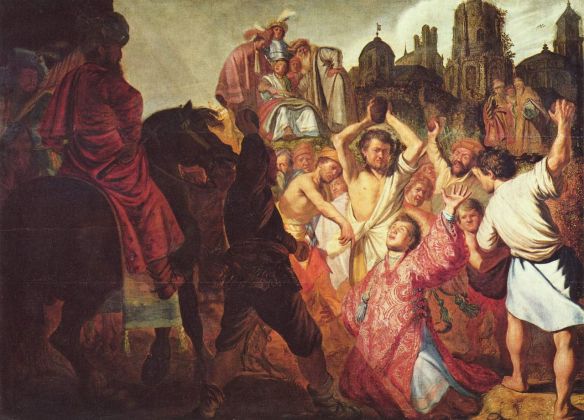You’re running late for an important appointment and your ride isn’t here yet. You expected everything to be prepared ahead of time and, when you arrive, you find everyone rushing around at the last-minute. The presentation is going well, until the projector lamp goes out. When you ask for a replacement bulb, your assistant sheepishly shrugs their shoulders.
If you haven’t presented at a meeting or seminar, these events may be foreign to you. But we’ve all depended on someone to meet their commitment, pick up the slack, or come through in a pinch. We need to rely on one another.
In a more essential way, that’s true for the church, the body of Christ. The Apostle Paul says it like this:
…Speaking the truth in love, we are to grow up in every way into him who is the head, into Christ, from whom the whole body, joined and held together by every joint with which it is equipped, when each part is working properly, makes the body grow so that it builds itself up in love. Ephesians 4:15-16 English Standard Version (ESV)
There is something foundational in relying on those in the church. The Protestant Reformer, John Calvin, frames the nature of our relationships with Christ and each other:
But, speaking the truth. Having already said that we ought not to be children, destitute of reason and judgment, he now [charges] us to grow up in the truth. Though we have not arrived at man’s estate, we ought at least…to be advanced children.
The truth of God ought to have such a firm hold of us, that all the contrivances and attacks of Satan shall not draw us from our course; and yet, as we have not hitherto attained full and complete strength, we must make progress until death.
He points out the design of this progress, that Christ may be the head, “that in all things he may have the pre-eminence,” (Colossians 1:18,) and that in him alone we may grow in vigor or in stature. Again, we see that no man is excepted; all are [commanded] to be subject, and to take their own places in the body.
…A healthful condition of the church requires that Christ alone “must increase,” and all others “must decrease.” (John 3:30) Whatever increase we obtain must be regulated in such a manner, that we shall remain in our own place, and contribute to exalt the head.
…If each individual, instead of attending exclusively to his own concerns, shall desire [interrelationships], there will be agreeable and general progress. Such, the Apostle assures us, must be the nature of this harmony, that men shall not be [permitted] to forget the claims of truth, or, disregarding them, to frame an agreement according to their own views…
Then, he explores the functioning of that vital, shared relationship:
From whom the whole body. All our increase should tend to exalt more highly the glory of Christ. This is [proven] by the best possible reasons. It is he who [provides for] all [that we lack], and without whose protection we cannot be safe. As the root conveys sap to the whole tree, so all the vigor which we possess must flow to us from Christ.
There are three things here which deserve our attention:
The first [has already] been stated: All the life or health which is diffused through the members flows from the head; so that the members occupy a subordinate rank.
The second is, that, by the distribution made, the limited share of each renders the communication between all the members absolutely necessary.
The third is, that, without mutual love, the health of the body cannot be maintained.
Through the members, as [channels], is conveyed from the head all that is necessary for the nourishment of the body. While this connection is upheld, the body is alive and healthy. Each member, too, has its own proper share, — according to the effectual working in the measure of every part.
Finally, Calvin declares the result of this organic interdependency when all is properly functioning:
Lastly, he shows that by love the church is edified, — to the edifying of itself in love. This means that no increase is advantageous, which does not bear a just proportion to the whole body. That man is mistaken who desires his own separate growth. If a leg or arm should grow to a prodigious size, or the mouth be more fully distended, would the undue enlargement of those parts be otherwise than injurious to the whole frame?
In like manner, if we wish to be considered members of Christ, let no man be anything for himself, but let us all be whatever we are for the benefit of each other. This is accomplished by love; and where it does not reign, there is no “edification,” but an absolute scattering of the church.
In context of this scripture, Archbishop of Constantinople John Chrysostom explored the consequences of our not clinging to, but rather dividing, Christ’s body, the church:
…If therefore we desire to have the benefit of that Spirit which is from the Head, let us [stick like glue] one to another. For there are two kinds of separation from the body of the Church; the one, when we [grow] cold in love, the other, when we dare commit things unworthy of our belonging to that body; for in either way we cut ourselves off from the “fullness of Christ.” But if we are appointed to build up others also, what shall not be done to them who are first to make division?
Nothing will [serve] to divide the Church [so much as the] love of power. Nothing so provokes God’s anger as the division of the Church. [More accurately], though we have achieved ten thousand glorious acts, yet shall we, if we cut to pieces the fullness of the Church, suffer punishment no less [stinging] than they who mangled His body.
For that [i.e., Christ’s Crucifixion] indeed was brought to pass for the benefit of the world, even though it was done [by men] with no such intention; whereas this [i.e., church division] produces no advantage in any case, but the injury is excessive. These remarks I am addressing not to the governors only, but also to the governed.
…This injury is not less than that received at the hands of enemies, [or rather, more than that], it is far greater. For that [, i.e., injury at an enemy’s hands,] indeed renders [the church] even more glorious, whereas this, when she is warred upon by her own children, disgraces her even before her enemies. Because it seems to them a great mark of hypocrisy, that those who have been born in her, and nurtured in her bosom, and have learned perfectly her secrets, that these should [all] of a sudden change, and do her enemies’ work.
Therefore, rely on Him and serve others.
Johnny Q. Public – Body Be (Official Music Video,) YouTube, Gotee records, Lyrics, Available on Amazon





